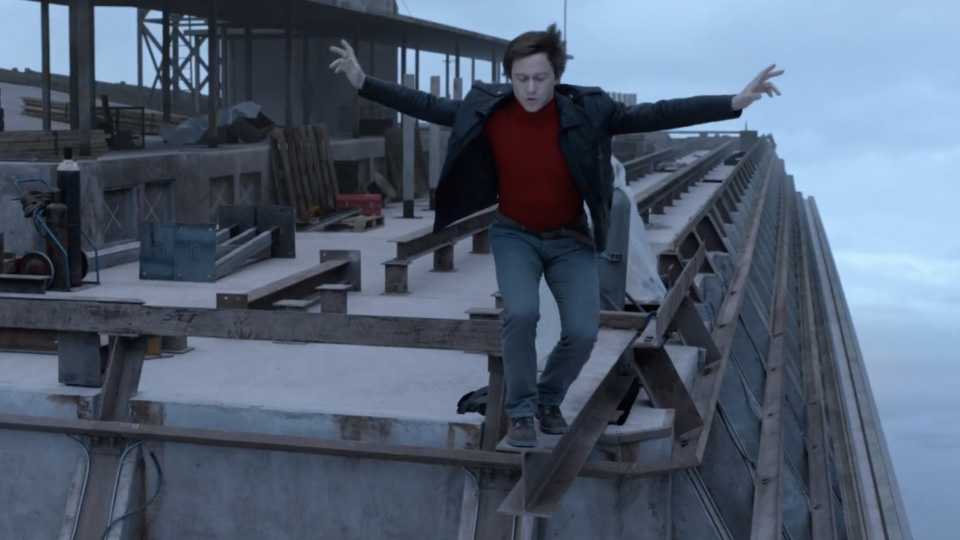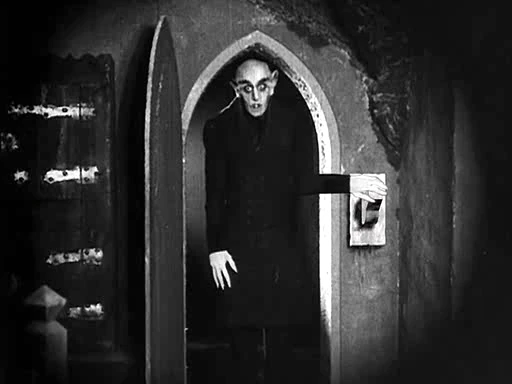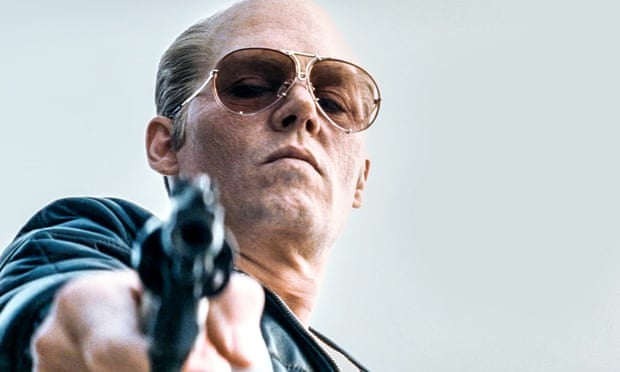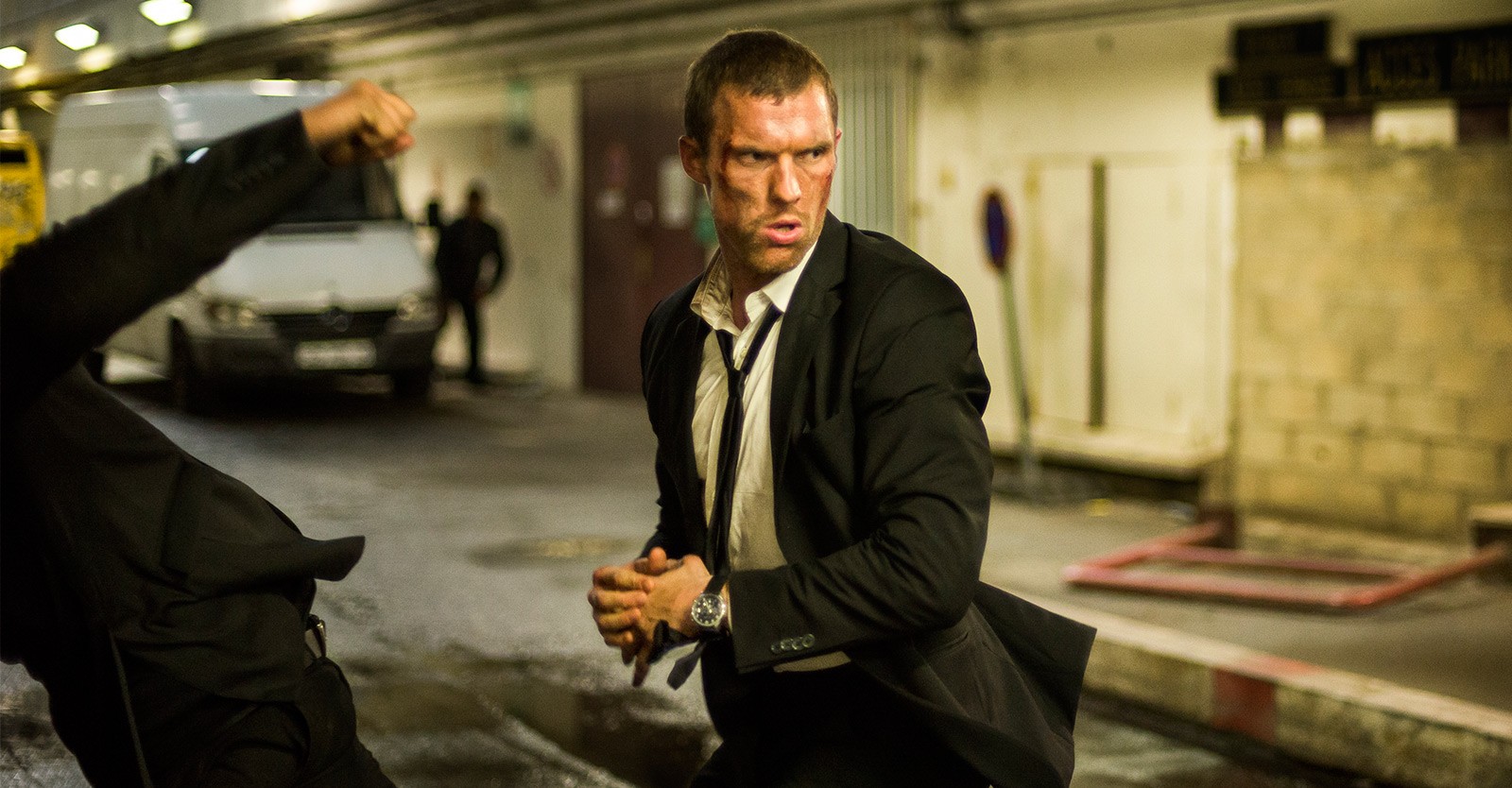 |
| Joseph Gordon-Levitt as Philippe Petit in "The Walk." Image courtesy TriStar Pictures. |
Philippe Petit (played by Joseph Gordon-Levitt) is a hundred stories above the streets of New York, waiting to take his first steps on a wire to take him between the World Trade Center's two towers. “The Walk” has built up to this moment, kept the audience waiting to see if the man can conquer what he himself has deemed the impossible without falling back to the concrete streets below. He grabs his pole, steadies himself as much as any human being possibly can, and takes the first few steps above the void.
What happens next is depicted brilliantly in 3D by director Robert Zemeckis; a riveting, technical marvel that places the viewer into the protagonist's world amid the clouds. It's as close as anyone can get to replicating Petit's real experience, and the effect is equal parts disorienting and thrilling.
But what happens before the titular walk is just as important and very much vital to establish why exactly a man would even attempt to walk across the Twin Towers. The answer offered by Gordon-Levitt’s character during his opening monologue is effectively “why not?”, although “The Walk” does offer at least a glimpse into the Frenchman's thinking. He's a brash, talented troubadour who entertains tourists within a self-imposed chalk circle in Paris. The small potatoes nature of his scope changes when he reads an article about the World Trade Center – still under construction at the time – and is enchanted by the possibility of crossing between those buildings.
What comes next is a trial run on Notre Dame, a small training montage with master tightrope walker Papa Rudy (Sir Ben Kingsley), and the courting of charming street musician Annie (Charlotte Le Bon). As Gordon-Levitt puts it, she becomes accomplice No. 1 in his scheme (which he dubs a coup), and he recruits others (including characters portrayed by James Badge Dale and Ben Schwartz) to accomplish his dream. He also meets a like-minded fellow who works at the World Trade Center (Steve Valentine) eager to offer his assistance to the coup. After a few weeks of preparation – in which Gordon-Levitt receives what should be a devastating injury – the day of the event arrives, and the team has to navigate through tight security and a few unforeseen glitches to reach the top of the towers.
“The Walk” is at heart a heist film akin to “Ocean's 11” in which a charismatic leader somehow convinces enough people to stop their lives to accomplish an improbable. And it's a pretty fun little caper film as well, with Zemeckis showcasing a playful side not seen since the four-year stretch between “Who Framed Roger Rabbit” and “Death Becomes Her.”
 |
| Playful with a hint of terrifying. |
“The Walk” is rather lighthearted and goofy for a film about a man risking his life to cross such a dangerous chasm, a feeling created in large part by the casting of Gordon-Levitt as Petit. Gordon-Levitt, who sports a rather preposterous French accent but offers a very good performance – is a natural ham who is happy and eager to engage in a little silliness to entertain an audience. His performance doesn't quite nail the zealousness of the real-life Petit, but he captures the puckishness, the arrogance and the inherent dreamer behind the rascally daredevil.
Gordon-Levitt's attitude, along with the tone of the film, shifts dramatically once Petit and his friends set up the tight rope between the buildings and the moment of truth begins. It's the moment where Zemeckis' knack for depicting the unimaginable kicks in and the tension of the feat itself takes over, and while there remains a hint of whimsy to the proceedings, everything else is played straight to evoke as much anxiety from the audience as possible. The highlight comes during the moment when Gordon-Levitt's Petit finally takes a second to look down from his perch above New York City and appreciate exactly what he is doing. Tightrope walkers are not supposed to do this, he notes during a bit of narration, yet the strangeness and uniqueness of the situation essentially requires that bit of reflection.
The minutes in the air for “The Walk” is the film's calling card, but Zemeckis incorporates the 3D technology well before as well, using the technology to have a little fun with his imagination and immerse the audience into the film.
I'm not sure how well the film will work outside of a movie screen – the acting, script and story support the effects instead of the other way around – but this is one of the rare films actually worth seeing in 3D and in theaters. Just be prepared to gasp a few times while watching Gordon-Levitt's Petit reenact Icarus and reach for the sun.
 |
| Except with fewer snakes and bats to contend with. |
Click here to see the trailer.
Rating: PG
Run time: 123 minutes (Two hours and three minutes)
Genre: Biographical
Ask Away
Target audience: People in need of a little risk in their movie going adventures.
Target audience: People in need of a little risk in their movie going adventures.
Take the whole family?: It'll get a bit too intense for rather young kids, but the PG rating is apropos for anyone without too great of a fear of heights.
Theater or Netflix?: Theater and with the 3D option included. It is legitimately worth the extra expense, and you should really only see it in theaters.
Is “The Walk” a requiem for the Twin Towers?: The film does serve as a bit of an eulogy for what was lost, although that element is shoehorned in. “The Walk” tries to posit Philippe Petit as the reason New Yorkers came to appreciate the towers – it argues his feat humanized them a little – which is a bit of an overreach. Still, it does offer a lovely romanticization of what they represented to Petit and many others; a monument to man's ability to accomplish the impossible.
Watch this as well?: “Man on Wire” isn't as technically marvelous – it is a documentary, after all – but it gets into Philippe Petit's motivation and personality in more depth and includes some rather fun historical reenactments.
 |
| Plus images of him doing it. No pic, no proof my arse. |

















